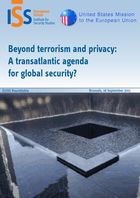You are here
Beyond terrorism and privacy: a transatlantic agenda for global security?

The purpose of this roundtable was to reflect upon broadly-defined Euro-Atlantic security cooperation including the fight against terrorism, the rule of law, respect for fundamental freedoms, good governance, etc. What strategic direction should such cooperation take? What are the major challenges that need to be addressed? In a shifting global environment, is the transatlantic security partnership still indispensable? And how have new security challenges impacted on our societies? The discussion confirmed that the transatlantic security agenda is indeed broad and goes substantially beyond privacy and terrorism problematique. While many areas in the already ongoing security cooperation between the US and the EU have been identified (transportation security, information exchange, cybersecurity, radicalisation, and addressing internal security concerns through external action), there was also agreement on the obstacles to further advancing EU-US security cooperation, in particular where too much attention is paid to ‘little differences’ and internal challenges related to the EU’s policymaking process (i.e. the need to coordinate between 27 member states and agencies and the involvement of numerous actors at the European Union level). The panellists also suggested a number of concrete steps that need to be taken to ensure that EU-US security cooperation contributes to achieving each partner’s individual security objectives, but also to more comprehensive security and justice in other parts of the world.